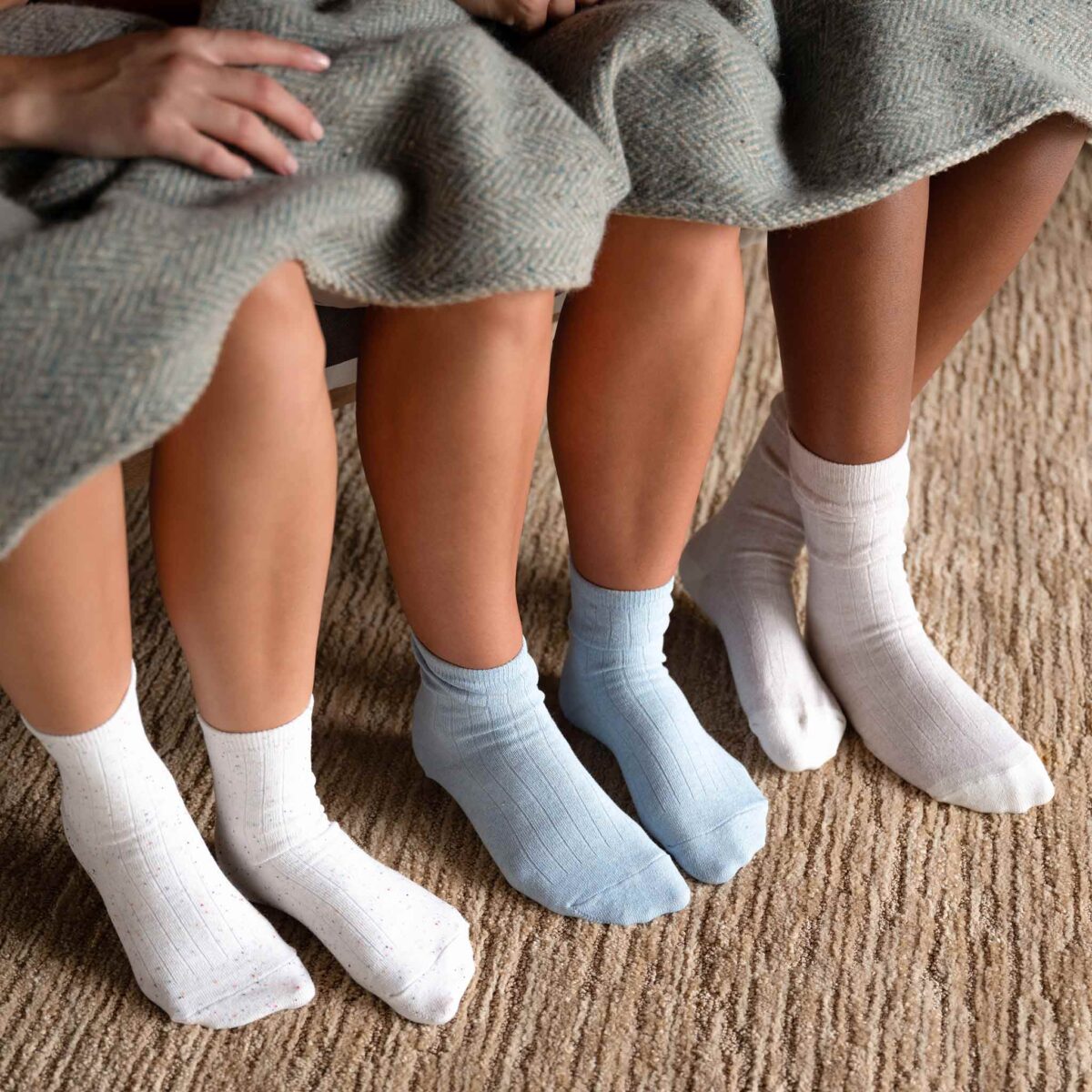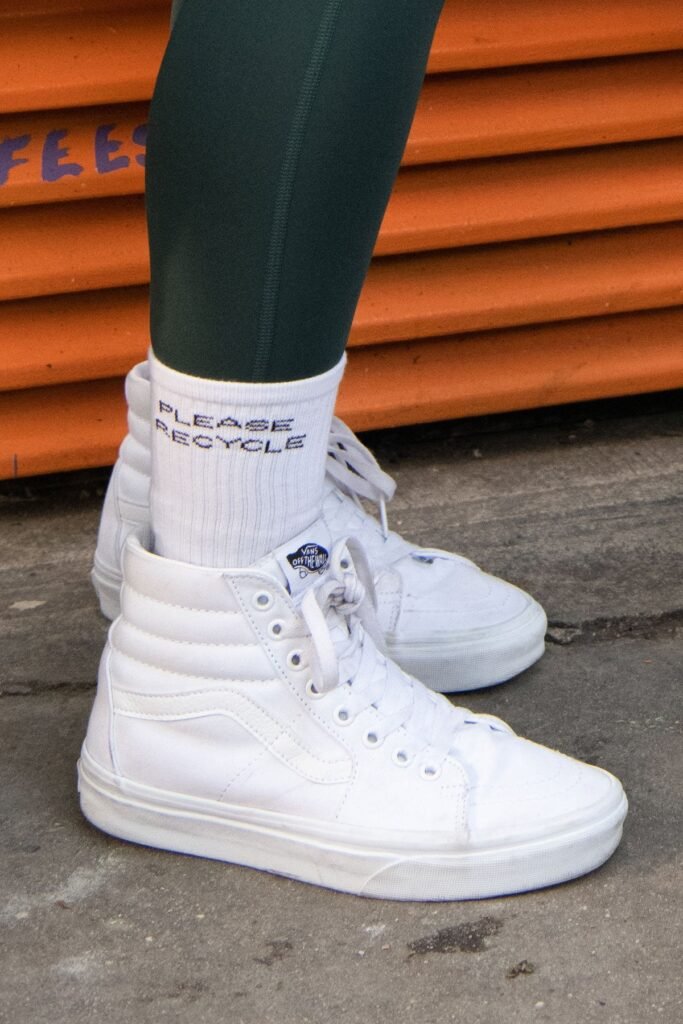10 Eco-Friendly Socks And Slippers Perfect For A Lazy Winter Day

Share This Article
Recycled plastic water bottles, organic cotton, and fair trade factories make these eco-friendly socks your next favorite cozy things.
| All products featured on The Wellness Feed are independently selected by our editors for their environmental and ethical impact. However, we may earn an affiliate commission when you buy something through our retail links. |
Soft tees and snuggle-worthy blankets must be paired with cozy slippers and socks. These are the real winners of winter gear that will keep you toasty from Thanksgiving until the end of the Holiday season. Because, let’s face it, most of us have feet that get cold easily and if we can keep them warm in a cute pair of eco-friendly socks, then we’re here for it. These slippers and socks are just that. They’re soft and warm and made from recycled plastic bottles, and organic cotton and made under fair trade practices to ensure that you can feel good about what you’re slipping your feet into. And, you might even feel that they make cozy gifts to pass out to your loved ones all season long too.
Anti-Waste Slippers
Inspired by a Christmas gift of traditional boots Russians wore in Siberia (Valenkis), this family-owned Swiss brand was founded in 2013. Although, they officially launched in 2015 after a successful Kickstarter campaign. Baabuk is also a certified B Corporation, meaning they have to meet strict standards when it comes to the supply chain, environmental impact, and transparency.
Environmental Impact: Baabuk’s super-comfortable slippers for men and women are handmade in Nepal using only 100% New Zealand mulesing-free sheep wool. The company teamed up with a fellow Swiss brand POMOCA to create the Pomobuk, which turns unrecyclable waste from Pomoca’s plush free-ride ski skins into warm footwear. Each sole is randomly crafted from Pomoca’s seven shades of skins depending on what waste is available. Built to be super light, soft, and unique, these slippers are designed to be worn season after season, year after year. They look like a dream, right?
Renewable Wool Slippers
Allbirds Wool Dwellers
Made from 60% Reused Wool Scraps, 40% GRS Certified Recycled Polyester
$65 ($32 Sale)

Allbirds is a San-Francisco-based (but originally from New Zealand) company founded in 2014, that became famous for its super comfortable Merino wool sneakers. Allbirds went completely Carbon Neutral in 2019 and it utilizes 90% recycled packaging.
Environmental Impact: Allbirds have two slippers – or “Loungers” as they call them – the Wool Loungers and Tree Loungers, both of which have replaceable insoles and are machine washable. The insoles are made with castor bean oil, which emits less carbon than petroleum-based foam and ZQ Merino wool. Their sugarcane midsole is called SweetFoam™ which is an alternative to the petroleum-based foam traditionally used in footwear. The Tree Loungers are made from a textile engineered using Eucalyptus pulp, which, according to the founder, is “one of the most sustainable materials on the planet.” The process of making this new material uses 5% of the water and one-third of the amount of land used to make traditional footwear.
Soft Bamboo Jersey Slipper

Florielle Lenzing™ EcoVero™ Floral Slipper Socks
Made from 65% Lenzing™ Ecovero™, 30% organic cotton, 5% elastane jersey
$20 ( $13 Sale)
Thought is a British brand that offers the coziest natural slipper socks crafted with bamboo and organic cotton and they feature a triple-layer, recycled polyester lining. The hand-drawn prints make these slippers unique. Their motto of “Wear me, love me, mend me, pass me on,” a reminder to look after what we own, made us fall in love with them even more.
Environmental Impact: Thought reduces its climate impact through its use of recycled paper for shipping its products. Their garment bags are also made from compostable cornstarch. Additionally, it reuses most of its off-cuts to minimize textile waste. Lastly, its use of eco-friendly materials like organic cotton, bamboo, and hemp limits the amount of harmful chemicals, water, and wastewater used in production. All of their recycled products come with a Global Recycled Standard certificate too.
Handmade Wool Socks
Toast began making loungewear and nightwear in 1997 in a small farmhouse in Wales. Their long-lasting slippers are made while following fair-trade principles. They are available in lots of different types and vivid colors, but the eco-friendly ones are the natural-colored jute clogs.
Environmental Impact: In 2019, Toast used Go Green DHL to offset 305,980kg of CO2 emissions. Their customer packaging for online orders is made from kraft paper which is 100% recyclable and completely biodegradable. Furthermore, over 85% of the materials they use are natural. This includes the use of organic and recycled cotton and Indigo Flow which is the cleanest and most sustainable method of Indigo dyeing currently available. This method achieves up to 70% reduction in water use, better dye penetration, and ensures clean water at the end of the process that is fit for reuse.
Ethically-Made Fur Slippers
GEROLDING Fur Slippers
Made from lamb fur in a small factory that is zero waste and recycles water $140

The Austrian and family-run company Giesswein has been producing knitted wool products since 1954 when they started making sweaters. With their 3D-Stretch technology, 100% pure virgin wool is turned into these soft, and comfortable Giesswein slippers. These winter slippers have an anti-slip sole made of natural rubber, which is colored with the help of sustainable food coloring – completely chemical-free. Merino wool also has incredible antibacterial properties, which will keep you feeling—and smelling—fresh.
Environmental Impact: The company is committed to using 90% recycled water in its manufacturing process. They were actually the first in Austria to introduce a water recycling facility. They also commit to zero scrap wastage and they refrain from using crude oil in their processes. All the energy used throughout the production process is from renewable sources. Lastly, they are 100% against mulesing.
Heavyweight Merino Wool Socks
Patagonia is an outdoor focused brand and a leader in sustainability for the past four decades. They have a great selection of high-quality eco-friendly socks for the outdoors, that are made of sustainable and fair-trade components. Specifically, they’re made with responsibly sourced merino wool blended with nylon. All dyes are PVC free and phthalate-free.
Environmental Impact: When it comes to their green business practices, this is where this brand stands out. Some of their many initiatives include recycling materials, bluesign® technologies work at each step of the supply chain to approve products that are safe for the environment, workers, and customers, they offer repairs, replacements, or refunds through their Iron Clad Guarantee, and are piloting a regenerative farming certificate.
Recycled and Recyclable Crew Socks
On June 25, Girlfriend Collective launched ‘Everyday GF’, a four-piece line of socks and underwear. In the collection, you’ll find two sock styles — quarter-length and crew-cut — in seven different colors, that are cushioned with extra arch support.
Environmental Impact: Girlfriend Collective will also be donating 100% of the net proceeds from ‘Everyday GF’ to three organizations supporting Black communities- The Loveland Foundation, The Okra Project, and the NAACP Legal Defense Fund. Each pair of socks is made using recycled yarn and two recycled plastic bottles. This is especially important since intimates are some of the items that are most commonly disposable. To further their zero-waste initiatives, the company has partnered with Unifi to create an upcycling program called ReGirlfirend, where customers can give back worn Everyday GF socks and undies to be recycled into new items. In return, they will receive $15 towards a future purchase.
Organic Cotton Socks
Stephen Steele founded Kind Socks in 2017 after he saw a market gap for socks that were simultaneously colorful, fun, ethically made, and sustainable. This Black-owned company makes unisex socks using organic cotton, sourced from a GOTS-certified organic cotton manufacturer in India. No pesticides and no toxic chemicals are used in the process.
Environmental Impact: Kind Socks is also committed to making sure all of their suppliers and workers are paid fairly and have safe working conditions. Additionally, for each pair of eco-friendly socks they sell a percentage of profits are donated to a different charity. Keep your toes happy while also helping the environment.
Natural White Organic Cotton Sock

Women’s Organic Cotton Socks Natural-White Crew
Made from 88% organic cotton 10% stretch nylon 2% elastic. $12
Harvest & Mill makes its clothing (and eco-friendly accessories) from 100 percent U.S.-grown and sewn organic cotton, which means these eco-friendly socks support USA farmers, American heritage mills, and their local sewing community. And, being organic they also help to keep American soil, water, and air clean. If you’re into earth tones, then you will definitely love these socks!
Buzzword Breakdown: What Makes Organic Cotton So Good For The Earth?
Environmental Impact: Harvest and Mill’s socks are natural, completely undyed, and unbleached. The color of the sock is the color of the plant fiber! Their black fabric is made with low-impact fiber reactive dyes in the U.S. which follows all EPA discharge and environmental laws, some of the strictest in the world. The company’s toxin-free initiative aims to build a new supply chain with clean and ethical practices. Since their supply chain is 100% USA domestic, it has a low-carbon impact. Plus, all Harvest and Mill packaging is plastic-free and compostable.
Recycled Plastic and Upcycled Cotton Socks
Nisolo Cotton Mid Sock
Made with over 50% recycled materials reducing landfill waste. $15 (Sale $10)

Nisolo is a Certified B Corp company providing steady employment opportunities for shoemakers in Peru & Mexico. Their socks are made from recycled plastic, upcycled cotton and wool sourced from a family-owned mill in North Carolina.
Environmental Impact: Nisolo is one of the most transparent brands since it provides an impact report and several web pages detailing its sustainability-related efforts across its supply chain. For instance, most of their materials (like polyester and leather) are recycled materials and they use chrome-free dyes in the leather tanning process for their shoes. Nisolo has also partnered with EcoSphere+ to offset their production’s carbon emissions. For every Nisolo product sold, the brand makes a contribution to help protect forests in the Cordillera Azul of the Peruvian Amazon. Since early 2018, Nisolo has protected 138,180 trees from deforestation in the Amazon Basin.
Organic Cotton Socks That Protect Marine Life
Conscious Step Socks That Protect Sharks
Made from 75% Fairtrade Organic Cotton, 23% Recycled Polyester, 2% Elastane $16

Conscious Step was founded in 2013 in none other than New York City. The eco-friendly socks are boldly colorful with in-your-face patterns all made from a blend of GOTS-certified fabrics.
Environmental Impact: Each sock is ethically made in India, in factories that ban child labor and promote workers’ rights through initiatives such as minimum wage compliance and overtime compensation. The cotton used in these socks isn’t genetically modified or treated with herbicides, insecticides, or pesticides. With each purchase, you have the option of contributing $1 to nonprofits like That Save LGBTQ Lives, Socks That Give Water, Socks That Plant Trees, and Oceana to protect marine life and animals like snarks.





